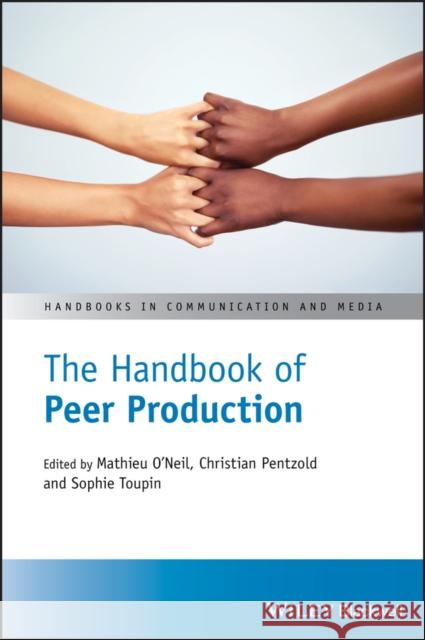The Handbook of Peer Production » książka



The Handbook of Peer Production
ISBN-13: 9781119537106 / Angielski / Twarda / 2021 / 464 str.
The Handbook of Peer Production
ISBN-13: 9781119537106 / Angielski / Twarda / 2021 / 464 str.
(netto: 839,36 VAT: 5%)
Najniższa cena z 30 dni: 868,77
ok. 30 dni roboczych.
Darmowa dostawa!
PrefaceAuthor biographiesChapter summariesList of tablesList of figuresPart I ? IntroductionChapter 01 ? The Duality of Peer Production: Infrastructure for the Commons, Free Labor for Firms (Mathieu O?Neil, Sophie Toupin & Christian Pentzold)Part II ? Concepts: Explaining Peer ProductionChapter 02 ? Grammar of Peer Production (Vasilis Kostakis & Michel Bauwens)Chapter 03 ? Political Economy of Peer Production (Benjamin Birkinbine)Chapter 04 ? Social Norms and Rules of Peer Production (Christian Pentzold)Chapter 05 ? Cultures of Peer Production (Michael Stevenson)Chapter 06 (reprint) ? Commons-Based Peer Production and Virtue (Yochai Benkler & Helen Nissenbaum)Part III ? Conditions: Enabling Peer ProductionChapter 07 ? Prophets and Advocates (George Dafermos)Chapter 08 ? Virtue, Efficiency, and the Sharing Economy (Margie Borschke)Chapter 09 ? Openness and Licensing (Melanie Dulong de Rosnay)Chapter 10 ? User Motivations in Peer Production (Sebastian Spaeth & Sven Niederhofer)Chapter 11 ? Governing for Growth in Scope: Cultivating a Dynamic Understanding of How Peer Production Collectives Evolve (Rebecca Karp, Amisha Miller & Siobhan O?Mahony)Part IV ? Cases: Realizing Peer ProductionChapter 12 ? Free & Open Source Software (Stephane Couture)Chapter 13 ? Wikipedia and Wikis (Jutta Haider & Olof Sundin)Chapter 14 ? Hacker Cartography: Participatory Mapmaking and Technological Power (Adam Fish)Chapter 15 ? Peer Learning (Panayotis Antoniadis & Alekos Pantazis)Chapter 16 ? Biohacking (Morgan Meyer)Chapter 17 ? Makers (Yana Boeva & Peter Troxler)Chapter 18 ? Blockchain (Pablo Velasco Gonzales & Nate Tkacz)Chapter 19 ? Wireless Community Networks (Gwen Shaffer)Chapter 20 ? Urban Commons (Nicholas Anastasopoulos)Part V ? Conflicts: Peer Production and the WorldChapter 21 ? Peer Production and Social Change (Mathieu O?Neil & Sebastien Broca)Chapter 22 ? Peer Production and Collective Action (Stefania Milan)Chapter 23 ? Feminist Peer Production (Sophie Toupin)Chapter 24 ? Postcolonial Peer Production (Maitrayee Deka)Chapter 25 ? Gaps in Peer Design (Francesca Musiani)Chapter 26 ? Makerspaces and Peer Production: Spaces of Possibility, Tension, Post-Automation, or Liberation? (Kat Braybrooke & Adrian Smith)Chapter 27 ? Peer Production and State Theory: Envisioning a Cooperative Partner State (Alex Pazaitis & Wolfgang Drechsler)Part VI ? Conversions: Advancing Peer ProductionChapter 28 ? Making a Case for Peer Production: Interviews with Peter Bloom, Mariam Mecky, Ory Okolloh, Abraham Taherivand & Stefano ZacchiroliChapter 29 ? What?s Next? Peer Production Studies? (Mathieu O?Neil, Sophie Toupin & Christian Pentzold)Chapter 30 ? Be Your Own Peer! Principles and Policies for the Commons (Mathieu O?Neil, Sophie Toupin & Christian Pentzold)
Mathieu O'Neil is Associate Professor of Communication at the University of Canberra's News & Media Research Centre where he researches the political economy of peer production and conducts network and content analyses of online controversies. He is also Honorary Associate Professor of Sociology at the Australian National University, where he contributed to the creation of the Virtual Observatory for the Study of Online Networks. He previously held academic appointments at the Université Stendhal - Grenoble 3, the Australian National University and the Université Paris Sorbonne. He has also worked as a magazine editor and exhibition curator in Singapore, and as a researcher for the Australian Department of Broadband, Communications and the Digital Economy. He is the founder of the Journal of Peer Production. His work has been published in Social Networks, Journal of Peer Production, Réseaux, Information, Communication & Society, Organization Studies, New Media and Society, and the International Journal of Communication, among others.Christian Pentzold is Professor of Media and Communication at the Department for Communication and Media Studies, Leipzig University, Germany. Before that, he worked in the Centre for Media, Communication and Information Research at the University of Bremen and the Institute for Media Research at Chemnitz University of Technology. He is broadly interested in the construction and appropriation of digital media and the roles, information and communication technologies play in modern society. His work in communication research and media analysis links to insights coming from cultural sociology, linguistics as well as science and technology studies. In current projects, he looks at the public understanding of big data, the organization and governance of peer production, as well as the interplay of time, data, and media. His work has come out with Media, Culture & Society, New Media and Society, Communication, Culture and Critique, and the International Journal of Communication.Sophie Toupin is a Fonds de recherche du Québec - Société et culture (FRQSC) postdoctoral fellow at the University of Amsterdam where she explores the linkages between feminism, data, and infrastructure. She completed her Ph.D. in the Department of Art History and Communication Studies at McGill University, Montreal, Canada. Her doctoral research examined the relationship between technology and anti-colonialism during the South African anti-apartheid struggle. Her work has been published in New Media and Society, Feminist Media Studies, Canadian Journal of Communication, Ada: A Journal of Gender, New Media, and Technology, and Journal of Peer Production, among others.
1997-2026 DolnySlask.com Agencja Internetowa
KrainaKsiazek.PL - Księgarnia Internetowa









